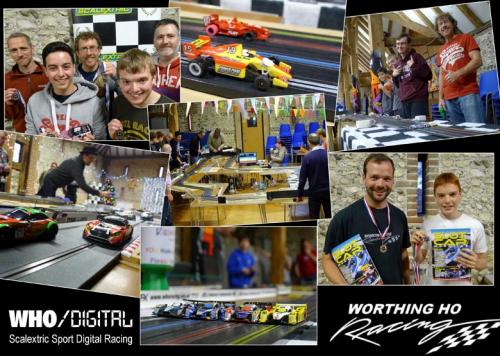(13th-Dec-19, 09:18 PM)dvd3500 Wrote: But instead of focusing on what doesn't work I though I would try to find out what DOES work.
If you have a healthy, successful club or at least a regular set of meetings for slot racing, what are the things that people really like and enjoy and make them come back?

Our club in Worthing - running both HO analogue and 1/32 Scalextric Digital - does seem to work, if you're looking for a big, low-cost, family-friendly slot car club. This was our tenth season and - in terms of attendances - it was our second worst, averaging 19 racers per event over the twenty Wednesday evenings and four all-day Saturdays. For the ten years, our average varies between 18.9 and 25.4 racers per event and has dipped below 20 only twice. Our highest attendance was 36 (with eight 30+) and the lowest 11 (twice - with 15 events of 15 people or less). Twenty to twenty-four is an ideal number to fit a heats & step-up finals format between 7 and 9.30pm. For our HO and digital team races, thirty-two people is great!
In terms of attracting new racers, this year was better than average. Seventeen people (ten who were under-16s) raced HO for the first time, 13 making return visits and six already having bought cars for next season. Eighteen people raced Digital for the first time, eight making return visits (more may do so) and those eight have all bought or are buying cars for next season. Only four of the new digital racers were under-16s.
Four or five of those newbies came along with an existing WHO racer, around ten said they found us direct on facebook, twitter or instagram; seven came as a result of the ARC Air track at a local windmill (four raced, three couldn't make it but came to the next WHO race); two chaps found us via another slot forum; three we met through our ARC Air track at Gaugemaster's AutoFest; and another two had been receiving our pre- and post-race emails for three years having given us contact details at a local fair where we had a Micro Scalextric track.
However, that's only part of the story. Most people had also checked out the pictures, videos and reports on our website and social media platforms and seen we were a family-friendly, welcoming and lively club - they liked what they saw. Our website and social media are all about creating a buzz around our events, give clear information and are reasonably free from slot car jargon. When people turn up through the door, we do have to make good on the promise of a warm welcome and a fun evening. I think we do okay.
Price-wise, new racers can participate fully in fifteen (14 from next season) HO events for only £3 per race (£2 under-16s). We have no membership fee and no car purchases are necessary. The club cars I prepare and maintain often run better than some racers' cars. A package to run in all three HO classes - F1, Nascar and WHO Mod - will set you back £39 or £33 if you decorate the Nascar body. This buys you an AFX Mega-G+ Gen6 Nascar, an F1 body and a pair of silicone tyres. There's no reason why that shouldn't run well for 2-3 seasons with maybe new shoes (£1.30 a pair) and a new pinion (£1) each year. The club provides 55-ohm DS controllers, which is what a lot of racers eventually buy themselves.
For our Scalextric digital racing, the entry fee is the same £3 and £2 per Wednesday evening or per session on a Saturday (so £6 and £4 for a morning and afternoon). No car purchase is necessary on a Wednesday - we run a club car team race and then finish with a Trans-Am pairs race where new racers are invited to pair up with an owner-driver - or a newbie pair might get loaned a car. The evening format is designed as an introduction to digital racing - gradually increasing the complexity of the digital simulations through the evening - and there is always a team mate to help out and to offer encouragement. If there are no newbies, it is still a cracking evening of racing.
The Saturdays are our least accessible events. They still include a Club Car Rotation race, which takes up almost all the morning and a 45-minute GT team race in the afternoon where newbies are integrated into the teams. To participate fully in the day, a Scalextric BTCC car is required (£42.50 chipped from Jadlams + £3 for a pair of tyres) for the three 16-lap BTCC sprint races. Eventually racers look at getting a Scalextric GT3 car (same cost) and maybe a Slot.it Group C - although the Group C race is the shortest of the day. We had ten racers buy Group Cs for this year and a few more planning to get one for 2020. That a bog-standard Slot.it is the pinnacle of our racing, might just sum up the accessibility ethos of our club.
Anyway, that's a few things about what does work for us, both in terms of running a club and attracting new racers. It is important to say that what we have - a big, low cost family-friendly club - is exactly what we set out to create in 2009-10. It won't be everyone's aim.
There is loads more on our website:
http://whoracing.org.uk/ and here on SlotRacer Online.